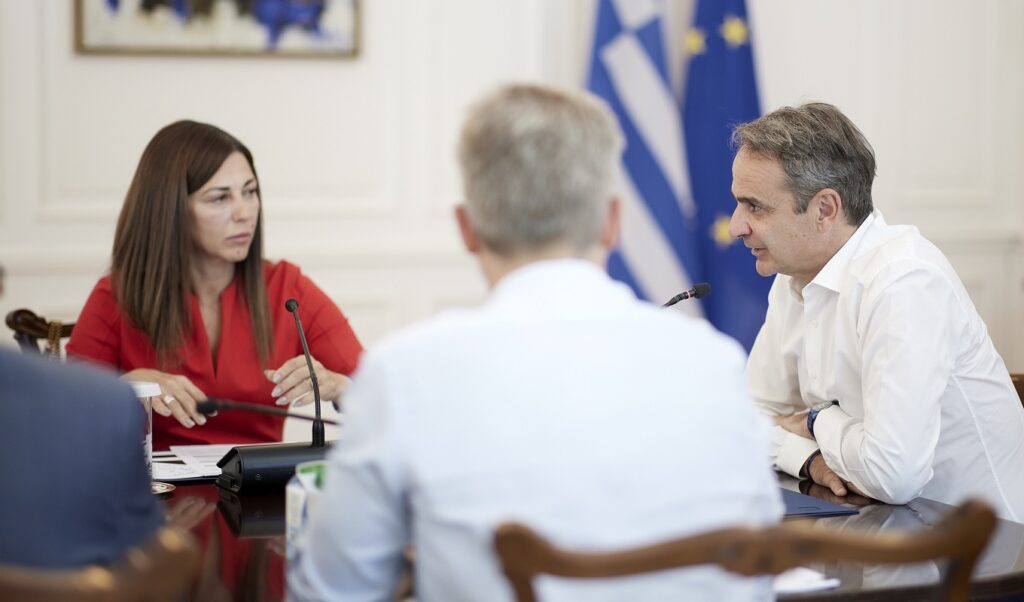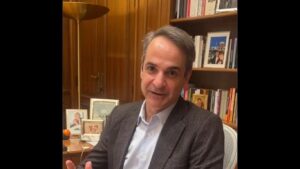Prime Minister Kyriakos Mitsotakis chaired a meeting on Monday morning (7/7) with the political leadership of the Ministry of Education to examine proposed legislative regulations for the country’s public universities. During the meeting, a new legislative regulation was presented that will provide older students who have demonstrably tried to complete their studies with one last chance to obtain their degree.
Read: “Eternal” students make up half of those enrolled in Greek universities – What the data shows
The proposed regulation stipulates that older students who have completed at least 75% of their study program credits and have successfully participated in at least two examination periods over the past two academic years will have the right to extend their studies for up to two additional semesters. In cases where practical training, thesis, or dissertation work is required, the extension can reach three semesters.
It is estimated that the regulation affects more than 35,000 older but active students.
Removals from September
Beyond this category, it was reconfirmed that next September inactive students from four-year programs who had already exceeded their program duration in 2021-22 will be removed, as the four-year grace period granted at that time is about to expire. As noted, student rosters at public higher education institutions currently include students who enrolled in the 1930s, while those enrolled from the 1960s, 1970s, and 1980s number in the tens of thousands.
In this way, among other things, Greek universities’ performance in many quality indicators will improve, as individuals who appear unable to graduate for many years will be removed, while simultaneously freeing up administrative staff work hours.
During the meeting, final provisions were also examined that will be put to public consultation regarding further strengthening security at public institutions, with key points including establishing a mechanism for imposing criminal and disciplinary sanctions within clear time limits, strengthening accountability, and utilizing technology for preventive protection of university spaces.
Mitsotakis: “Significant clearing of rosters”
During the meeting, the Prime Minister stated: “With the provisions we discussed today, we will essentially complete immediately a very significant reform that we had prioritized in our program for the new Greek public university as we envision it.
We are essentially talking about a significant clearing of inactive student rosters, many of whom have been enrolled in public university rosters since the 1950s and 1960s.
This clearing of university rosters will have very significant benefits regarding the qualitative characteristics of universities, regarding evaluation indicators, as for the first time we will have a substantial picture of which students are actually studying.
But I also want to emphasize the very significant provision for one last chance for those students who have demonstrably shown they are interested in completing their studies, as well as provisions for students who may, for health reasons, have a distinct, special difficulty completing their study programs.
This regulation is therefore completely balanced, but also implements our central commitment to proceed with an absolutely necessary clearing of university student rosters, making the distinction between inactive and active students, so that universities can know precisely whom they are addressing and plan accordingly.
Finally, and with the opportunity of the new academic period beginning, let me say this: very often young people come to me asking which school to choose. I tell them to choose the school they feel suits them best, but to ensure that whatever school they choose, they take care to finish within the scheduled time of the study program they have chosen.
And to do this because life is ahead of them. If you need to finish your program in four years, why waste time and finish in the fifth or sixth year? You won’t be able to finish much later anyway.
But this primarily constitutes an obligation of young people to themselves. It’s not something the state imposes punitively, but an encouragement in an extremely competitive environment. And since the state provides free public education to our young people, our young students, they should be consistent with their obligations, but do it primarily because it’s good for them, not for us, not for parents, not for anyone else.”
Zacharaki: “Last chance”
Education, Religious Affairs and Sports Minister Sofia Zacharaki noted for her part: “President and dear colleagues, this is a significant day as we will soon have the final regulations in consultation, with which we serve a deeply political dual goal and principle: the necessary clearing of rosters from inactive students of years past, and of course the necessary and institutional safeguarding of a last chance for people who both deserve it and are entitled to it and will have it.
However, with the initial reform that the New Democracy government voted for in 2021 and is now improving, the Greek university can indeed have an accurate picture of who is studying. And of course, how it can better, with increased funding, with other provisions for student accommodation, for internationalization and all the things we need to do for the public university, become reality.
A necessary step, therefore, and thank you for giving us the opportunity to present this improved provision as the last chance and the distinction between active and inactive students.”




